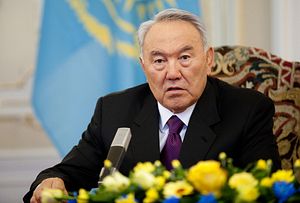The UN General Assembly will decide on June 28 whether Kazakhstan will become the first Central Asian country to join the Security Council. The vote will mark the end of a multi-year campaign by Kazakhstan in which it naturally focused on the positives Kazakhstan has to offer.
Erlan Idrissov, Kazakhstan’s foreign minister, recently wrote that the country could “feel proud of the remarkable progress (it) has made” since independence in 1991, noting also Kazakhstan’s contribution to nuclear non-proliferation and to resolving international crises in Ukraine and Iran. The country is “ready to assume new responsibilities as part of the global community,” he said.
This is clearly not the full story, at least not where human rights are concerned.
It’s no secret that many current or past Security Council members have problematic human rights records, including the Permanent Five: Russia, China, the U.K., France, and the U.S. But that does not mean that Kazakhstan’s record, like that of every other candidate, should not also be scrutinized.
That can be done in UN corridors in New York in a way that is not happening in Kazakhstan itself, because the government’s restrictions on freedom of expression has meant that there has been little free debate within the country about the context in which its bid for a Security Council seat is taking place. So whether or not Kazakhstan becomes a member of the Security Council – and Human Rights Watch has no position on its candidacy – this is an opportunity to highlight its human rights record and to gain a fuller understanding of its domestic policies.
Idrissov, the foreign minister, says that Kazakhstan is a “young democracy” that is still moving “to a full democratic system.” Like many countries, it faces major challenges in its economic, social, and political development. The country is, for instance, in the midst of an economic downturn, and also experienced an alleged terrorist attack this month in the western city of Aktobe, which left 19 people dead, most of them alleged attackers. Yet the newness of its democratic credentials or other challenges are no excuse to avoid fulfilling basic human rights commitments it has made by voluntarily entering into UN treaties.
In recent years Kazakhstan has introduced new or reinforced restrictions on freedom of association, speech, and assembly, and on religion. When people tried to hold peaceful protests in many cities last month over land rights issues, the police immediately detained hundreds, including journalists and human rights monitors, in some cases using force. Over two dozen activists, allegedly linked to the planned protests, were jailed in the lead up to the aborted demonstrations. Some now face criminal charges.
Kazakh authorities limit peaceful dissent more broadly, including by trying to silence government critics using the vague and overbroad criminal offense of “inciting social, national, clan, racial, or religious discord,” which it has used to criminalize behavior and speech protected under international human rights law. Kazakhstan has blatantly ignored repeated calls, from UN bodies and others, to repeal or amend this charge. Instead it increased the maximum sanctions from 12 to 20 years in a new criminal code adopted in 2014.
Kazakhstan restricts media freedoms, and independent and opposition journalists face harassment and interference in their work. In December 2012, for instance, courts, in rushed and perfunctory trials, banned the newspapers Vzglyad, Golos Respubliki, and their affiliated sites, and prohibited K+ and Stan.TV from broadcasting. Since then, other outlets have also been closed, including Assandi Times, Pravdivaya Gazeta, and the ADAM bol and ADAM journals.
Despite Kazakhstan’s repeated claims to promote “religious reconciliation,” the country’s restrictions on the practice of religion make it very difficult for some religious groups to operate legally and large numbers have been fined for peaceful worship outside state controls since the adoption in 2011 of a restrictive religion law.
As its UN bid focusses attention on the country, Kazakhstan has been keen to highlight its economic development since independence and its efforts on the global stage. Almost in the same breath, however the government argues that the 25 years since independence is too short a time to realize basic human rights for its citizens.
One excuse for this anomaly is President Nursultan Nazarbaev’s philosophy of “economy first, politics later.” Yet the recent economic downturn, nationwide protests, and wider instability have raised serious questions on how long this approach can last. New Security Council member or not, it’s time for Kazakhstan to meet its longstanding international commitments and aim to genuinely make human rights one of the issues it can identify as making progress on.
Hugh Williamson is the Europe and Central Asia division director at Human Rights Watch. Mihra Rittmann is Central Asia researcher for Human Rights Watch.

































